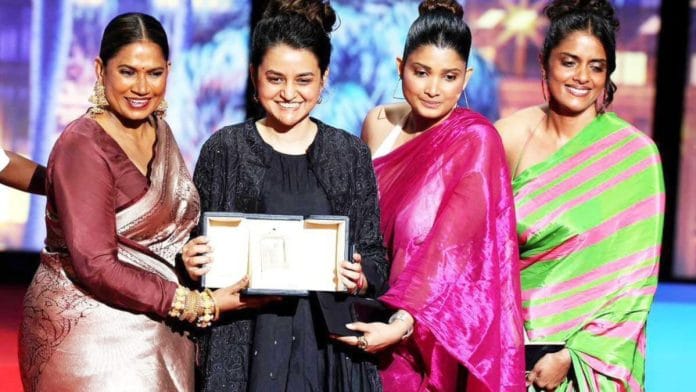New Delhi: Payal Kapadia’s historic win at the 2024 Cannes Film Festival put the spotlight not just on the director, but also on the fact that the film, All We Imagine as Light, became the first Indian production to be awarded the Grand Prix. The question of who funded and produced the award-winning movie, and if the National Film Development Corporation of India was a co-producer, is now part of a heated debate in the film circuit and among viewers.
All We Imagine as Light is the first film by an Indian female director to be showcased in the main competition.
The Malayalam-Hindi movie tells the story of two young women, Prabha (Kani Kusruti), a nurse from Mumbai, and Anu (Divya Prabhu), her roommate. It was shot for over 25 days in Mumbai, followed by another 15 in Ratnagiri.
Prime Minister Narendra Modi and information and broadcasting minister Anurag Thakur congratulated Kapadia for her achievement. “I am proud to share that this film is also the official co-production of the I&B Ministry and is supported by its Film Incentive Scheme,” Thakur wrote in his post on X.
Many congratulations to FTII alumnus Payal Kapadia for winning the Grand Prix at the 77th Cannes Film Festival for her film All We Imagine as Light. This makes it the first Grand Prix win for the country and a nomination in the Palme d'Or after 30 years.
Bharat's creative… pic.twitter.com/Ad915hXMZ0
— Anurag Thakur (मोदी का परिवार) (@ianuragthakur) May 26, 2024
Even the Ministry of Information and Broadcasting (MIB) and Press Information Bureau shared congratulatory messages for Kapadia over X, though stressing that it is a co-produced film.
A fake account of the director, with almost 13,000 followers, thanked the minister.
The All We Imagine as Light team says the movie is a co-production between Paris-based producers Petit Chaos and Mumbai’s Chalk & Cheese Films. “The other co-producers are Arte France Cinéma, BALDR Film, Another Birth, Les Films Fauves, and Pulpa Film,” says the press note obtained by ThePrint. The film has been co-produced under a treaty between France and India. The lion’s share of its funds have come from Europe.
The filmmaker and producers have declined comment on this matter.
The govt mandate
The government document detailing co-production rules between India and other countries has a mandate to list producers in a particular manner. Kapadia’s film does not mention the Government of India or NFDC anywhere.
The 2016 India-France agreement allows filmmakers from both countries to raise funds. But when NFDC extends funds, it automatically becomes a co-producer and can claim credit. Otherwise, the film is classified as the product of individual producers.
“It’s a rule of thumb to acknowledge a producer. If there are no credits, most likely one is not a producer,” mentioned a former NFDC official who did not wish to be named.
Kapadia’s award acceptance speech does not mention government support either, nor do any of her interviews.
Under the Incentive Scheme for Production of Foreign Films in India, productions that qualify a certain criterion can claim a cashback incentive of up to 30 per cent on Qualifying Expenditure in India. Apart from that, a 5 per cent bonus can be claimed for employing 15 per cent or more Indian workforce and an additional bonus of 5 per cent for significant Indian content. The incentive is subject to a maximum cap of Rs 30 crore.
Kapadia’s previous film, A Night of Knowing Nothing (2021), had a Sundance grant, an IDFA-Bertha fund, and regional and national funds from France.
The challenge
The 2016 treaty facilitated movies like the Irrfan Khan-Nimrat Kaur starrer The Lunchbox (2013), which also went to Cannes that year. Some other prominent co-productions include Punjabi-language films Qissa (2013), directed by Anup Singh, and Chauthi Koot (2015), directed by Gurvinder Singh. Each of these films credits NFDC as producer.
“In Chauthi Koot, NFDC was a producer and it gave 50 per cent of the film’s funding. So that is real co-production,” said Singh. For independent filmmakers, raising funds for their films is a challenge. While the initial funding by NFDC raised the hopes of independent filmmakers, there has been no funding in the last few years. There are no films mentioned under the list of co-productions funded by it either.
The last Indo-French co-production listed on its website is the 2023 film, Schirkoa.
Even with co-productions, the process does not seem to be encouraging.
In a 2018 interview, Marc Baschet, one of the producers of The Lunchbox, spoke about the challenges of co-producing a film in India.
“We need someone to tell us where to find the richest culture, someone to see our script and tell us which is the best place to shoot,” said Baschet.
ThePrint reached out to NFDC for a comment, but there has been no response so far.
“I assessed Payal’s first-year project in FTII [Film and Television Institute of India] as a jury and knew she was special. Whatever Indian filmmakers have achieved in the last few years is due to personal grit. Hard work, talent, and creativity can only take you that far. There is no ecosystem to do justice to one’s possibilities,” said Singh.
(Edited by Humra Laeeq)






